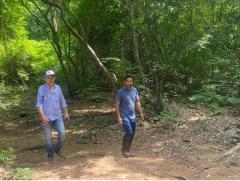For leaders from the Xinka Parliament, one of the Indigenous authorities behind an ongoing national strike in Guatemala, the new government will provide a foundation to continue the struggle for democracy.
This interview is the first of a three-part series of conversations with Guatemala activists.
Shade underneath a white tent, pitched close to a humble stage in front of the Ministerio Público (MP) in Guatemala City, keeps members of the Xinka Parliament from burning under the setting sun. Equipped with a microphone and speaker, community members take turns making political demands and sharing words of encouragement with fellow demonstrators gathered to resist attacks on Guatemala’s democracy. A banner that hangs from the tent memorializes the recent murder of Noé Gómez Barrera, a Xinka Parliament member and outspoken environmental activist.
The Xinka Parliament is the assembly of ancestral authorities of the Xinka people. Formed in 2004, the Xinka Parliament has been on the frontlines of territorial defense against the transnational Escobal silver mine. As part of this struggle, the Xinka have faced official denial of their existence as an Indigenous people, despite holding centuries-old titles to some of their lands. In the past two decades, 14 Xinka leaders have been killed for defending their territories and another 200 have been criminalized.
Among their most recent struggles, the Xinka Parliament joined other Indigenous authorities like the 48 Cantones of Totonicapán in convening a national strike in support of a peaceful transition of state power on January 14, 2024. This interview is part of a three-part interview series with Indigenous leadership during the Indefinite National Strike, launched on October 2, 2023.
Miguel Ángel Rodríguez is an authority of the Xinka Parliament, whose involvement with the organization began as a local representative for environmental defense in his hometown community of Mataquescuintla, Jalapa nearly 12 years ago. Luis Fernando García is a graduating student of law at the autonomous University of San Carlos (USAC). Both have been present at the resistance in front of the MP since day one.
We spoke with Rodríguez and García outside the MP on November 9, 2023, day 39 of the ongoing national strike (103 days at the time of publication). Our conversation has been edited for length and clarity.
NISGUA: The Xinka people have prioritized work towards strengthening the Xinka Parliament and the defense of the territory. What have been the greatest achievements of the Xinka Parliament since its founding? What have been some of the main challenges?
Luis Fernando García: One of the largest silver mining projects in the world has been halted. Since 2017, there have been two permanent resistance movements demanding that the state comply with a historic 2018 ruling, which directly orders the state and the mining company to hold a [community] consultation and temporarily suspend the Escobal mining project.
Before that, we had to come sleep for 10 months outside the Constitutional Court because the state refused [to halt the mining project]. One of the arguments directly from the state and the mining company was that there were no Indigenous populations in the area. The objective was to ignore the consulting process by saying: “Since there is no Indigenous population, we do not need to carry out a community consultation.” A ruling [favorable to the Xinka Parliament] was achieved, and we are now in the second phase of compliance with that ruling. We are already in the process of ensuring that the parties involved in the consultation, the ministries, deliver the information.
Miguel Ángel Rodríguez: We know that the political system is corrupted, all government bodies have been co-opted. We understand that the criminalization in our country is huge. We are not afraid because we know that we have [previously] had good people in ministries like the MP, but we know that [many people] have been exiled for opposing the system, and, unfortunately, today we don’t have them here. Anyone who opposes the corrupt system is criminalized. We know that we are in the struggle, and we believe that God will be with us. The day must come when we achieve many things that are of interest for all the people of Guatemala.
NISGUA: Recently pro-democratic parties like Movimiento Semilla have come to power in other Latin American countries, such as Colombia and Brazil. What is the Xinka Parliament’s perspective on the recent elections in Guatemala, and what do you expect or want to see from Bernardo Arévalo’s administration in the coming years?
LFG: The majority of the population that went to the polls voted with consciousness for [the party Movimiento Semilla]. We hope that they do the job as it should be done, although we understand that there are many issues that must change here to improve the system in Guatemala. With the arrival of this new government, we don’t expect change overnight, but we will have to keep working, continuing to make proposals from the grassroots bases of Indigenous peoples.
Something very important that has been said is that this government is going to govern directly hand in hand with the people. So, we hope that this will be the case with this new cycle, with this new government. And yes, definitely, the communities hope that with this government they can also [achieve] the resignation [of the Pact of the Corrupt].
MAR: I believe that the political system is doing everything it is doing against the Semilla party because Semilla was not part of the Pact of the Corrupt. If there had been a representative in the Pact of the Corrupt, I think things would’ve stayed silent, no? So, I think, it would be understandable that [the Pact] are afraid that things could change for them. For that same reason, many of us understand that we could have change in Guatemala. We know that it is not so easy to put up a fight in a co-opted country. I believe that it will not be easy for a party within [the state], but I believe that laying a foundation would also be significant for the country of Guatemala.
NISGUA: The 48 Cantones, together with other Indigenous and ancestral authorities, called for an indefinite national strike for democracy and against corrupt actors who violate the democratic process. What horizons and what possibilities do you anticipate for the future of Guatemala and for the Xinka Parliament after all this is over?
LFG: Right now the whole outlook is uncertain. There would be no concrete answer to this question because this entire situation has been quite heavy for Indigenous peoples. Coming here to protest has been quite complicated, but the people are not tired. The people are willing to continue coming as many times as necessary. We hope that in the next few days our objective will be achieved and then it will definitely be a different outlook. It must be built and analyzed together.
MAR: The struggle belongs to the 22 departments of Guatemala. There are links with all the ancestral authorities of the Indigenous peoples, so it is a hope for Guatemala.
NISGUA: Without yet knowing what is going to happen at this moment, what is the long-term future of Guatemala and what should the fight for justice, life and dignity be like?
LFG: Everything depends on the state through its three powers. We should legislate in a better way. The truth is that we have good laws, a good constitution, but unfortunately our justice system is applied in an erroneous manner. It is [applied] directly to always favor those who have the most money in this country.
I would hope that, in some future, this will change. That there will be judges who are more socially conscious, an MP that investigates all the facts, regardless of whether the person who is a victim of violence or rights violations, and who does not have the necessary resources, is treated as equal. The future is definitely uncertain; there is no place to fit in and somehow seek to be able to work transparently. A change is necessary, and we hope that, as Don Miguel said, good foundations can be obtained for a definitive change in this state.
MAR: We need governments that also take into account the Indigenous peoples, the ancestral authorities. I believe that in order to have clear communication and be able to lay good foundations, there would have to be a lot of participation from Indigenous peoples, that they should let them participate.
NISGUA: Is there anything you would like to share or communicate with the international community who are also involved in their own social and political movements for justice?
LFG: I think it is time for a change not only for Guatemala, but for more countries that also suffer from this parasite, which kills more every day. For example, here in Guatemala, it is unfortunate that we talk about a country in the grips of malnutrition knowing that we have sufficient resources here, but most of the resources are stolen by the state itself. Schools are in total abandonment. You go to the hospital with uncertainty that, if I go to a public hospital, I will die because there are no doctors to treat me or because there is no medicine.
I think, at the international level, it is known that the majority of public officials here in Guatemala are on the Engel List. It is complicated because we know that—despite being presidents that were elected by the people, being congressmen who were elected by the people, mayors elected by the people—they do not legislate in favor of the people but rather they legislate in favor of their own whims or in favor of businesspeople or others who have paid for most of their campaign expenses or to whom they owe favors. So, it’s unfortunate how we are today, here in Guatemala, but we hope for a change.
And to the eyes of the international community that are vigilant, that are in some way speaking out in favor of Indigenous authorities, we definitely know that all of us who participate in these movements could be at risk. We could be under some threat. So communications, displays of solidarity with the people of Guatemala are very important in these difficult times.
Indigenous authorities have their own forms of government, their own form of representation through their own customs from their communities. These authorities that today represent and have been representing Guatemala work directly on a voluntary basis for their communities and are the most honest people there are because they are elected under assemblies and do what the assemblies order them to do. Thus, it is very important to clarify that all the authorities or all the people who demonstrate here are not paid. It is not even a little, small amount. It is the people of Guatemala, who move on their own terms, with their own resources and who want to see a change for this country.
MAR: I think it is time to invite the entire population that up until now has not joined in the struggle. We know that we are in the struggle to defend our democracy. It is not as they paint us, that we are being paid. There are many critiques. I believe it is time for us to be intelligent citizens, for us to investigate and call all Christians as well, to join the struggle because we know that we are fighting for a legacy for our future generations, that we want to leave them a better country.
And to other countries, mainly those of Latin America, may we come together in this effort, may we unite every day to counteract corruption. I believe that together, we will achieve many good things.


